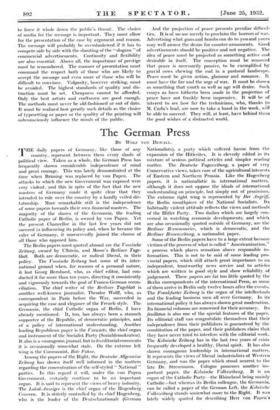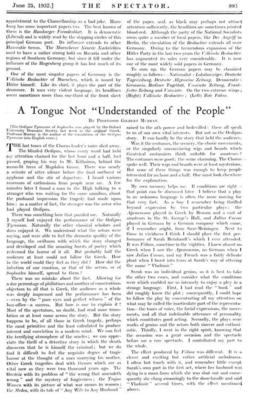The German Press By Woix vox DEWALL.
THE daily papers of Germany, like those of any country, represent between them every, shade of political view. Taken as a whole, the German Press has frequently shown considerable independence of mind and great courage. This was lately demonstrated at the time when Bruning was replaced by von Papen. The attacks to u-hich the new Government was exposed were very violent, and this in spite of the fact that the new masters of Germany made it quite clear that they intended to rule over the country by a hardly veiled dic- tatorship. More remarkable still is the independence of some papers towards their own financial masters. The majority of the shares of the Germania, the leading Catholic paper of Berlin, is owned by von Papen. Yet the present Chancellor in the last few years did not succeed in influencing its policy and, when he became the ruler of Germany, it unreservedly joined the chorus of all those who opposed him.
The Berlin papers most quoted abroad are the Vossische Zeitung, owned by Ullstein, and Mosse's Berliner Tage- blatt. Both are democratic, or radical liberal, in their policy. The Vossische Zeitung lost some of its inter- national ground when, for reasons of a personal nature, it lost Georg Bernhard, who, as chief editor, had con- ducted it for more than ten years, directing it consistently and vigorously towards the goal of Franco-German recon- ciliation. The chief writer of the Berliner Tageblatt is another well-known journalist, Theodor Wolff, who, as correspondent in Paris before the War, succeeded in acquiring the ease and elegance of the French style. The Germania, the chief Catholic organ of Berlin, I have already mentioned. It, too, has always been a staunch supporter of the Republic, of democratic principles, and of a policy of international understanding. Another leading Republican paper is the Vorzetirts, the chief organ and instrument of the Socialist Party (Sozialdemokraten). It also is a courageous journal, but in its editorial comments it is occasionally somewhat stale. On the extreme left wing is the Communist, Rote Fable.
Among the papers of the Right, the Deutsche Allgoneine Zeitung has shown itself well informed in the matters regarding the concentration of the self-styled " National" parties. In this regard it will, under the von Papen Government, certainly continue to be an important organ. It is said to represent the views of heavy industry. The Lokal-Anzeiger is the chief organ of the Hugenberg Concern. It is strictly controlled by its chief Hugenberg,, who is the leader of the Deutschnationale (German Nationalists), a party which suffered havoc from the expansion of the Hitlerites. It is cleverly edited in its mixture of serious political articles and simpler reading matter. The Deutsche Tageszeitung, a paper of very Conservative views, takes care of the agricultural interests of Eastern and Northern Prussia. Like the Hugenberg papers, it is nationalistic in international matters, although it does not oppose the ideals of international understanding on principle, but simply out of pessimism.. The extreme right wing is represented by Der Angrifi; the Berlin mouthpiece of the National Socialists. Its habitually violent attitude reflects the views and methods of the Hitler Party. Two dailies which are largely con- cerned in watching economic developments, and which are also occasionally quoted outside of Germany, are the Berliner Borsencourier, which is democratic, and the Berliner Borsenzeitung, a nationalist paper.
Some of the Berlin papers have to a large extent become victims of the process of what is called " Americanization," a process which places sensation above responsible in- formation. This is not to be said of some leading pro- vincial papers, which still attach great importance to an independent, trustworthy news service and to articles which are written in good style and show reliability of judgement. These papers are far too little quoted by the Berlin correspondents of the international Press, as some of them arrive in Berlin only twelve hours after the events. The Frankfurter Zeitung is the organ of the intellectuals and the leading business men all over Germany. In its international policy it has always shown great moderation. Its financial columns are renowned for their accuracy. Its feuilleton is also one of the special features of the paper. Its editorial staff can congratulate themselves that their independence from their publishers is guaranteed by the constitution of the paper, and their publishers claim that they have never tried to interfere with the editorial work. The Kelnische Zeitung has in the last two years of crisis frequently developed a healthy, liberal spirit. It has also shown courageous leadership in international matters. It represents the views of liberal industrialists of Western Germany, and was the paper which stood nearest to the late Dr. Strescmann. Cologne possesses another im- portant paper, the Kiilnische Volkszeitung. It is an organ of the Catholic Party—the Rhineland being mainly Catholic—but whereas its Berlin colleague, the Germania, can be called a paper of the German Left, the Kanische Volkszeitung stands somewhat more to the Right. • It was lately widely quoted for describing Herr von raven's
appointment to the Chancellorship as a bad joke. Hans- burg has some important papers too. The best known of them is the Hamburger Fremdenblatt. It is democratic (Liberal). and is widely read by the shipping circles of this :principal German port. Its influence extends to other Hanseatic towns. The Muenchener Neueste Nachrichten used to have a rather strong hold on Bavaria and other regions of Southern Germany, but since it fell under the influence of the Hugenberg group it has lost much of its ground.
One of the most singular papers of Germany is the rolkische Beobachter of Muenehen, which is issued by Hitler himself. Like its chief, it plays the part of the drummer. It uses .very violent language, its headlines cover sometimes more than one-third of the front sheet of the paper, and, as black may perhaps not attract attention sufficiently, the headlines are sometimes printed blood-red. Although the party of the National Socialists owns quite a number of local papers, like Der Ang,riff in Berlin, the circulation of the Beobachter extends all over Germany. Owing to the tremendous expansion of the Hitler Party in the last two years the Vakische Bcobachier has augmented its . sales very considerably. It is now one of the most widely sold papers in Germany.
To suns up, the German papers may be classified roughly as follows :—Nationalist : Lokalanzeiger, Deutsche Tageszeiiung, Deutsche AUgemrine Zeitung. Democratic : Germania, Berliner Tageblatt, l'ossische Zeitung, Frank- forter Zeitung and Vorzciirts. On the two extreme wings: (Right) Volkische Beobachter ; (Left) Rote Feline.



































 Previous page
Previous page